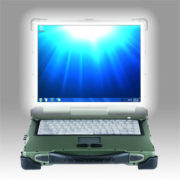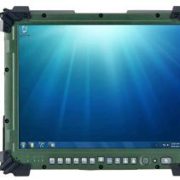 April 22 is Earth Day, a time in which we reflect on how our actions affect the environment. These effects can be quite surprising, even dangerous. For example, it probably never occurred to you that recycling computers could potentially hamper National Security.
April 22 is Earth Day, a time in which we reflect on how our actions affect the environment. These effects can be quite surprising, even dangerous. For example, it probably never occurred to you that recycling computers could potentially hamper National Security.
To explain this bizarre chain of causality, let’s explain a few basics. First, your computer is full of lead and lots of other nasty stuff. That’s why you are not supposed to just dump them the trash; decaying computers can pour a variety of toxins into landfills. Secondly, your computer is full of gold and other valuable materials. Computer disposal and recycling is a big business. You may have seen announcements, such as this one in the ARMY Times, offering cash or at least shipping costs for discarded electronics. Computer and other electronics recycling have become standard features of church and other nonprofit fund drives.
What you may not have realized is that an estimated 50 to 80% of computers and other electronic waste collected by American recyclers are exported to countries around the world. There, the computers are stripped for valuable parts (often in environmental conditions that are horrendous), and resold.
It’s the resold part that is of concern. According to Bloomberg Business Week and other sources, processors and other critical elements of the computers are repainted and otherwise altered to look like new parts. These are resold to the Department of Defense (DoD). Bloomberg quotes Robert P. Ernst, “…who heads research into counterfeit parts for the Naval Air Systems Command’s Aging Aircraft Program in Patuxent River, Md. Ernst estimates that as many as 15% of all the spare and replacement microchips the Pentagon buys are counterfeit.”
The Bloomberg article cites two DoD initiatives that have exacerbated this problem: the drive to buy as many Commercial Off The Shelf (COTS) products as possible, and the “set asides” established for small businesses. The military is buying processors and other vital components from literal mom-and-pop enterprises that operate out of someone’s living room. These suppliers are unfamiliar with quality of their products, which they often buy from semi-anonymous sources on the Internet.
As a result, old chips – erroneously labeled new and having met military rugged standards – have been found in systems, such as fighter jets. The DoD is aware of this problem, and there are ongoing attempts to initiate corrections.
In no way does this blog advocate that you do not recycle your computers. When all is said and done, it is still the most responsible thing to do.
To a certain extent, environmentalism is about awareness. Before the ecology movement gained steam, the standard operating procedure was to throw something out and forget about it; if it’s in the garbage it’s out of mind. We simply didn’t care what happened to our trash.
Environmentalism taught us that we need to think about our garbage. It doesn’t simply disappear. Improperly disposed of materials can pollute air, land, and water. Now we need to extend our awareness to the process of recycling itself. Otherwise, we will experience, in the words of retired four-star General William G.T. Tuttle Jr., former chief of the Army Materiel Command, “… a pollution of the military supply chain.”






